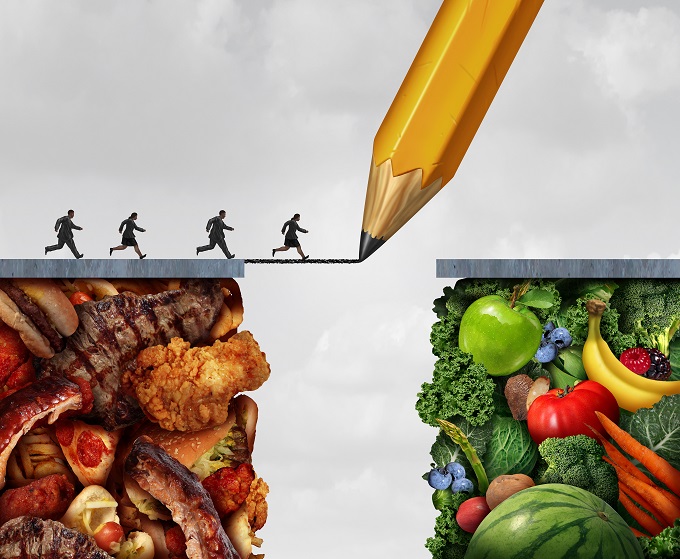Ethical veganism big concern for kids

Veganism is everywhere… except our curriculum.
According to Roy Morgan Research, the number of Australian adults that eat completely or almost meat-free diets increased from 1.7 million people in 2012 to nearly 2.1 million in 2016.
WE WROTE THIS REPORT FOR OUR TERM 1 ISSUE OF SCHOOL NEWS! CLICK HERE TO CHECK OUT THE FULL-LENGTH PIECE (AND THE REST OF THE MAG).
ABC recently surveyed more than 25,000 Australians about their diets and found that 10 percent of respondents identified as either vegan, vegetarian or semi-vegetarian (meaning they sometimes eat seafood or poultry). Just one percent identified as vegan, but the most interesting finding was that 50 percent of young people who refuse to consume animal products do so because of environmental concerns. Older people who avoid animal products overwhelmingly cited health concerns.
It’s hard to be a healthy vegan
There is research supporting the idea that veganism can be better for the environment. This is mainly because cattle grazing generates massive amounts of methane and carbon dioxide, well established greenhouse gases that contribute to climate change, as Harvard Professor of Epidemiology and Nutrition Walter Willett told NPR. So, it is easy to understand why young people are more interested in the vegan lifestyle amid rising reports of eco-anxiety around climate change. Our students live in communities where bushfires, floods and droughts are a near-constant threat and food is one of the few things they may feel they can control.
However, health experts have expressed concern about kids and teens ‘going vegan’ because of nutritional deficits. Doctors in Belgium even called for parents who force their children to follow a vegan diet to be prosecuted. The Royal Academy of Medicine of Belgium went so far as to publish a legal recommendation. Commission leader Professor Georges Casimir told The Telegraph: “This restrictive regime requires ongoing monitoring of children to avoid deficiencies and often irreversible growth delays. […] It is unsuitable for unborn children, children, teenagers and pregnant and lactating women. […] It is not medically recommended and even forbidden to subject a child, especially during periods of rapid growth, to a potentially destabilising diet, requiring frequent supplementation and control.”
Australian health officials advocate that vegan and plant-based diets can be healthy and beneficial to the environment, but care should be taken to avoid deficiencies. For instance, iron and B12 are often singled out as important nutrients for vegans and vegetarians to monitor and potentially supplement with. Public Health Nutritionist Mathew Dick told Queensland Health: “While many medical experts agree that a well-planned vegetarian or vegan diet can be a healthy way to eat, it is generally not recommended that young children adopt a vegan diet and parents should be cautious about putting their child on a vegan diet.”
As research indicates Australia will at least maintain its status as the third-fastest-growing vegan market in the world, should schools be tackling plant-based diets in schools? Veganism is everywhere: social media, fast food chains, documentaries and Netflix shows; popular celebrities and environmentalists like Greta Thunberg even advocate for people to ‘go vegan’ to help the planet. There are a lot of opinions, advocates, articles and debate out there but how much do students learn about the health and environmental impact of a like veganism? As it turns out, that is quite hard to quantify!
Food literacy is uneven (at best)
A 2017 Griffith University study interviewed home economics teachers about food literacy in Australian high schools and found that one year of compulsory ‘food related studies’ in either technologies of health or physical education (HPE) was “was insufficient to develop sustainable food-related life skills and introduce broader concepts of food literacy such as environmental sustainability”.
Currently, food education in Australia tends to centre food preparation and hospitality. Some schools tie in vocational activities, others have elective subjects where students may learn about topics like obesity or nutrition labelling. However, as Deakin University researchers found last year in material they published on The Conversation, there is far less “coverage of environmental and social issues, marketing practices or family dynamics” in secondary food education.
What should we do?
Well, Deakin University researchers argue upskilling food technology, or home economics teachers, could be a good solution. A more comprehensive food education programme that spans early-to-secondary education, avoiding repetitiveness and delving into cross-curricular issues like sustainability would be of benefit. They look toward the new Refresh.ED program in Western Australia, which focusses on ‘food systems’ and incorporates a wide range of topics, including food marketing and sustainable practice, that can be applied across the K-10 curriculum.







